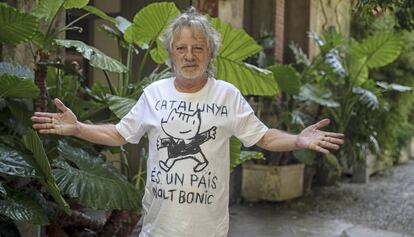“The Catalan independence train is still going but it has come off the rails”
Leading artists from Catalonia speak out against planned secession vote; entrepreneurs eye it warily

Driven by its desire to declare independence as soon as possible, the Catalan government has adopted a confrontational attitude against Madrid, but also against a large part of Catalan society: according to the latest opinion survey by the regional agency Centre d’Estudis d’Opinió (CEO), 49.4% of Catalans oppose independence while 41.1% favor it.
In recent weeks things have taken an authoritarian turn, as the least convinced members of government have been purged, while the head of the regional police force, the Mossos d’Esquadra, has been replaced with a hardcore secessionist.
I would not vote in elections that did not reach out to a majority of citizens and were not truly binding
Catalan singer Joan Manuel Serrat
The Spanish business sector is concerned, and views these events as one of the main threat to an economy that has recently emerged from a protracted crisis and a long political stalemate. The 50th Business Barometer, carried out by Deloitte for EL PAÍS, interviewed executives from 265 companies and found that three out of four (74%) feel that Catalan secessionism is bad for the Spanish economy. In Catalonia itself, that figure is 43%.
Intellectuals
But entrepreneurs are not the only ones who are worried: so are many writers and intellectuals. The Barcelona-born Eduardo Mendoza, winner of the Cervantes Prize, describes the planned independence referendum set for October 1 as “a derailed process. The train is still running, but off the rails.”
Nationalism, he says, “belongs to a different era, and it is not relevant in this matter (…) Catalonia all by itself is a very strange utopia that belongs in the realm of science fiction.”
Another winner of the prestigious literary award, Juan Marsé – himself a Catalan – has even harsher words about it. He says he is repelled by the way that regional premier Carles Puigdemont and fellow nationalist leader Oriol Junqueras “lie when they claim to speak in the name of the people, when they repeatedly and miserably claim to have received ‘a mandate’ from the people. The truth is, Mr Puigdemont and Mr Junqueras, two political luminaries who will go down in the history of Iberian grotesque, share a spectacular ignorance of the rule of law and of politics, and more specifically of the political history of Catalonia.”

And Joan Manuel Serrat, the most famous of all the singers that Catalonia has produced, adds: “I would not vote in elections that did not reach out to a majority of citizens and were not truly binding. Things should be happening to ensure that something this big takes place with all the guarantees required by such a grave decision.”
Joan Botella, a political science professor and dean of the Barcelona University School of Law, lists some of the reasons why the planned referendum is not legal: there is no international validation for it; it does not follow the rules set out by the Spanish Constitution; there is no Census Board, no electoral law, no neutrality by the parties who are calling the referendum. And there is a paradox: “It has not been called, it has merely been verbally announced, and it seems logical that a referendum of such import should be officially called with sufficient time before it is held.”
English version by Susana Urra.
Tu suscripción se está usando en otro dispositivo
¿Quieres añadir otro usuario a tu suscripción?
Si continúas leyendo en este dispositivo, no se podrá leer en el otro.
FlechaTu suscripción se está usando en otro dispositivo y solo puedes acceder a EL PAÍS desde un dispositivo a la vez.
Si quieres compartir tu cuenta, cambia tu suscripción a la modalidad Premium, así podrás añadir otro usuario. Cada uno accederá con su propia cuenta de email, lo que os permitirá personalizar vuestra experiencia en EL PAÍS.
¿Tienes una suscripción de empresa? Accede aquí para contratar más cuentas.
En el caso de no saber quién está usando tu cuenta, te recomendamos cambiar tu contraseña aquí.
Si decides continuar compartiendo tu cuenta, este mensaje se mostrará en tu dispositivo y en el de la otra persona que está usando tu cuenta de forma indefinida, afectando a tu experiencia de lectura. Puedes consultar aquí los términos y condiciones de la suscripción digital.









































